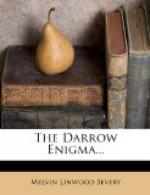While Maitland was thus engaged I did all in my power to distract Gwen’s attention, as much as possible, from her father’s body. Whenever she regarded it, the same intense and set expression overspread her countenance as that which at first had alarmed me. I was glad when Maitland returned from the window and began mixing some of the chemicals I had brought him, for Gwen invariably followed all his movements, as if her very existence depended upon her letting nothing escape her. Maitland, who had asked me for a prescription blank, now dipped it in the chemicals he had mixed and, this accomplished, put the paper in his microscope box to dry.
“I have something here,” he said, “which I desire to photograph quite as much as this room and some of its larger objects,” and he pinned a tiny, crumpled mass against the wall, and made an exposure of it in that condition. “Do you know what this is?” he said, as he carefully smoothed it out for another picture. “I haven’t the slightest idea,” I said. “It is plain enough under the microscope,” he continued, placing it upon the slide, and adjusting the focus. “Would you like to examine it, Miss Darrow?” Gwen had scarcely put her eye to the instrument before she exclaimed: “Why, it’s a piece of thin outside bark from a twig of alder.” Maitland’s face was a study... “Would you mind telling me,” he said deliberately, “how you found that out so quickly?” She hesitated a moment, and then said methodically, pointing toward the water, “I know the alder well —our boat is moored near a clump of them.” “You are a keen observer,” he replied, as he took the prepared paper from his box and spread the film of bark upon it to take a blue print of it. “There is one other object upon the sill which, unfortunately, I cannot take away with me,” he continued, “but shall have to content myself with photographing. I refer to a sinuous line made in the paint, while green, and looking as if a short piece of rope, or,




